#British Union of Fascists
Explore tagged Tumblr posts
Text
Archive link because I'm not giving any clicks to the fucking Guardian, but this piece about Sophie Lewis' Enemy Feminism. TERFs, Policewomen, and Girlbosses Against Liberation is pretty good. Some quotes:
Here we have May French Sheldon, a wealthy American feminist who in 1891 traveled “alone and unescorted” – that is, carried by 150 hired African workers but no white people – through Kenya and Tanzania beneath a US flag and a banner reading “noli me tangere” (touch me not), only to report on her return that everywhere she went, Africans had gathered around “entreating her to remain and rule over them”. She would go on to make several trips to Africa and become a staunch denialist of the Belgian genocide in the Congo. Sheldon’s is one of several forms of feminism that can only be expressed through the domination of people of color, an original sin of the movement that still troubles it today. (Lewis draws a direct line from Sheldon to Israel’s promotion of so-called “lionesses of the desert” who fought for the first time on the frontlines in Israel’s war on Gaza, writing: “Genocide is sometimes feminist.”) And here we have Mary Richardson, a British suffragette whose enthusiasm for the movement’s campaign of violence, arson and bombing saw her earn the nickname “Slasher” after she took a meat cleaver to a Diego Velázquez nude in the National Gallery. After the first world war, Richardson joined the British Union of Fascists and quickly assumed leadership of the women’s section, only to be expelled, two years later, for demanding “fair play” for women. [...] Another feminist ancestor in this tradition was Mary Sophia Allen. A British suffragette, Allen jumped at the opportunity the first world war gave her to “larp” (live-action role play) as a kind of volunteer auxiliary police officer, patrolling the private lives of working-class women living near troop installations. Her postwar career saw her traveling the world as a “woman’s police’ consultant”, promoting the dubious but persistent idea that criminalizing women’s sex lives can be feminist if a woman is the one applying the handcuffs. She wore a police uniform and monocle, called herself the “commandant” and spent a considerable amount of time in Spain and Germany, where she developed both a dedication to fascism and personal relationships with Francisco Franco and Adolf Hitler.
311 notes
·
View notes
Text

Uncredited Photographer British Police Charging Anti-fascist Demonstrators in Order to Make it Safe for Oswald Mosley's British Union of Fascists to March Through Then Largely Jewish East London, Resulting in the Battle of Cable Street, in Which the United Community Soundly Defeated the Fascists, Great Mint Street, East London 1936
325 notes
·
View notes
Note
dear fuck what did george do 😭 is there nobody left
apparently got excited about that fascist being in miami, though i guess the source is drive to survive, and when we see the clip we'll know for sure if it was a "holy fuck the president's here????" sort of excitement anyone would have, or a "omg let me suck him off" way. either way, bad look. goes against everything he claimed to be for. super disappointing. just prematurely preparing to be incredibly disappointed because lets be real, this isn't going to end up being option one. but yeah whatever, fuck trump and all his cronies. you all know i was a massive george fan, so this just sucks to see. so much for promoting women in racing, leading a goddamn union, supporting lewis' work on blm in 2020, for pretending to give a shit about ukraine, mental health, lgbtq rights, and so on.
so, in short: we dont know, but lets be real, hes a british white millionaire, so. yeah. prepare urself for whatever happens in dts though i will not be watching it bc i hate that show anyway.
68 notes
·
View notes
Note
Can you explain why 1984 is fundamentally reactionary? I remember seeing a journalistic article talking about the same thing but sadly it was paywalled
The whole premise of the book is "if we let the government do too much stuff, eventually the government will get so big it will do Everything and nobody will be able to stop it, it will grow so big it will be a self-perpetuating tyranny."
It's your typical liberal cautionary tale against "authoritarianism", conflating fascism and communism while understanding neither. Orwell had never been to the Soviet Union, and instead drew heavily from his own experience working for the British Ministry of Information. Later in his life, he would even compile a list of suspected Communists to hand over to British intelligence agents, some on the list included solely because they were gay or Jewish.
Animal Farm is another example of his reactionary sentiment, in which the peasants and workers of the Soviet Union are depicted as gullible and weak-minded animals jerked around at every turn by the pigs, a stand-in for Marxists in general and Bolsheviks specifically. Incidentally, Orwell during his time at the Ministry of Information had become acquainted with one Gertrude Elias, who shared with him her own idea for a cartoon film depicting the Nazis as tyrannical pigs ruling over the other animals in a farm. Orwell had told her the idea wasn't any good, before going on to write Animal Farm, replacing the fascists in the story with communists.
Here's a good read about Animal Farm by the way, which I feel shows very clearly the kind of reactionary Orwell was:
Compare Orwell's depiction of the mindless masses in Animal Farm to the "proles" in 1984. 1984 hardly mentions them except to say that they all live in squalor and have no agency worth considering, which allows them to live free of surveillance and control, since the State doesn't see any purpose in expending the resources to surveil them. They're all dumb, mindless addicts and gamblers whose only purpose is to provide menial labor. Meanwhile, the protagonist of the book, who is cunning and able to question the whole situation, is a middle-class white collar propagandist, just like Orwell was during his time at the Ministry of Information. Orwell clearly viewed himself as superior to the mindless masses, and he was a racist to boot, just look at what he wrote about the Burmese or the Irish. The Russian masses as depicted in Animal Farm needed little more than to be ordered around and they were willing to follow whoever was giving the orders. The English masses as depicted in 1984 needed a bureaucratic mountain of sophisticated social engineering dedicated entirely to manipulating every last minutia of information in society in order to be subject to the same level of control.
277 notes
·
View notes
Text
You know what's super cool and not at all fucked up:

Tracy-Ann Oberman is starring as Shylock in a reinvented Merchant of Venice, set during the Battle of Cable Street (when 3000 of the British Union of Fascists marched to the Jewish part of London and were repelled when the Irish, communists, socialists, various anti fascist groups came out and supported the Jews against this).
The irony of a woman starring in a play about defeating antisemitism and fascism being told not to go outside because of a danger of antisemitic attack should not be lost on anyone...
#jumblr#antisemitism#i/p#tracy-ann oberman#for those who dont know her she played the head of torchwood who got turned into a cyberwoman in S2 Dr Who finale#shes amazing
229 notes
·
View notes
Text
black & palestinian solidarities
if you support black liberation but are unsure of your stance on palestinian resistance, here’s a reminder that they are deeply intertwined. after the 1917 balfour declaration by the british government announcing the first support for a zionist state in palestine, zionism and israeli occupation of palestine have followed similar ideologies and practices to white supremacist settler colonial projects, so solidarity between black and palestinian communities has grown over time, seeing each other as fellow anti-imperialist and anti-racist struggles. (if you get a paywall for any of the sources below, try searching them in google scholar.)
palestinians have been inspired by and shown support for black liberationist struggles as early as the 1930s, when arabic-language newspapers in palestine wrote about the struggle by black folks in the united states and framed it as anti-colonial, as well as opposing the 1935 invasion by fascist italy of ethiopia, the only independent black african state at the time. palestinian support for black struggles grew in the 1960s with the emergence of newly-independent african states, the development of black and third world internationalisms, and the civil rights movement in the united states. palestinian writers have expressed this solidarity too: palestinian activist samih al-qasim showed his admiration for congolese independence leader patrice lumumba in a poem about him, while palestinian poet mahmoud darwish’s “letters to a negro” essays spoke directly to black folks in the united states about shared struggles.
afro-palestinians have a rich history of freedom fighting against israeli apartheid, where they face oppression at the intersections of their black and palestinian identities. some families trace their roots back hundreds of years, while others came to jerusalem in the nineteenth century from chad, sudan, nigeria, and senegal after performing the hajj (the islamic pilgrimage to mecca) and settled down. still others came to palestine in the 1940s specifically to join the arab liberation army, where they fought against israel’s ethnic cleansing of palestinians during the 1948 nakba (“catastrophe”). afro-palestinian freedom fighter fatima bernawi, who was of nigerian, palestinian, and jordanian descent, became, in 1967, the first palestinian woman to be organize an operation against israel, and subsequently the first palestinian woman to be imprisoned by israel. the history of afro-palestinian resistance continues today: even as the small afro-palestinian community in jerusalem is highly-surveilled, over-policed, disproportionately incarcerated, and subjected to racist violence, they continue to organize and fight for palestinian liberation.
black revolutionaries and leaders in the united states have supported the palestinian struggle for decades, with a ramp-up since the 1960s. malcolm x became a huge opponent of zionism after traveling to southwest asia and north africa (SWANA), publishing “zionist logic” in 1964, and becoming one of the first black leaders from the united states to meet with the newly formed palestine liberation organization. the black panther party and the third world women’s alliance, a revolutionary socialist organization for women of color, also supported palestinian resistance in the 1970s. writers like maya angelou, june jordan, and james baldwin have long spoken out for palestinians. dr. angela davis (who received support from palestinian political prisoners when she was incarcerated) has made black and palestinian solidarity a key piece of her work. and many, many more black leaders and revolutionaries in the united states have supported palestinian freedom.
while israel has long courted relationships with the african union and its members, there has been ongoing tension between them since at least the 1970s, when all but four african states (malawi, lesotho, swaziland, and mauritius) cut off diplomatic ties with israel after the 1973 october war. while many of those diplomatic relationships were reestablished in subsequent decades, they remain rocky, and earlier this year, the african union booted an israeli diplomat from their annual summit in addis ababa, ethiopia, and issued a draft declaration on the situation in palestine and the middle east that expressed “full support for the palestinian people in their legitimate struggle against the israeli occupation”, naming israeli settlements as illegal and calling for boycotts and sanctions with israel. grassroots organizations like africa 4 palestine have also been key in the BDS (boycott, divestment, sanctions) movement.
in south africa, comparisons between israel and south african apartheid have been prevalent since the 1990s and early 2000s. israel historically allied with apartheid-era south africa, while palestinians opposed south african apartheid, leading nelson mandela to support the palestinian liberation organization as "fighting for the right of self-determination"; over the years his statements have been joined by fellow black african freedom fighters like nozizwe madlala-routledge and desmond tutu. post-apartheid south africa has continued to be a strong ally to palestine, calling for israel to be declared “apartheid state”.
black and palestinian solidarities have continued into the 21st century. palestinian people raised money to send to survivors of hurricane katrina in the united states in 2005 (which disproportionately harmed black communities in new orleans and the gulf of mexico) and the devastating earthquake in haiti in 2010. in the past decade, the global black lives matter struggle has brought new emphasis to shared struggles. prison and police abolitionists have long noted the deadly exchange which brings together police, ICE, border patrol, and FBI agents from the united states to train with soldiers, police, and border agents from israel. palestinian freedom fighters supported the 2014 uprising in ferguson in the united states, and shared strategies for resisting state violence. over a thousand black leaders signed onto the 2015 black solidarity statement with palestine. the murder of george floyd by american cops in 2020 has sparked further allyship, including black lives matter protests in palestine, with organizations like the dream defenders making connections between palestinian and black activists.
this is just a short summary that i came up because i've been researching black and asian solidarities recently so i had some sources on hand; there's obviously so much more that i haven't covered, so please feel free to reblog with further additions to this history!
#free palestine#black liberation#black and palestinian solidarity#black and asian solidarity#original
667 notes
·
View notes
Text
Endeavour and Fascism
There's a thread of history running through Endeavour that's been on my mind a lot recently. It's a somewhat unified arc that runs through 3 episodes: Coda, Colours, and Raga. I was curious to learn more and did some research.
It's probably nothing new for folks in the UK, but for most of us in the US, it's not something we learned about in school.
So here goes...long post...
S3E4: Coda
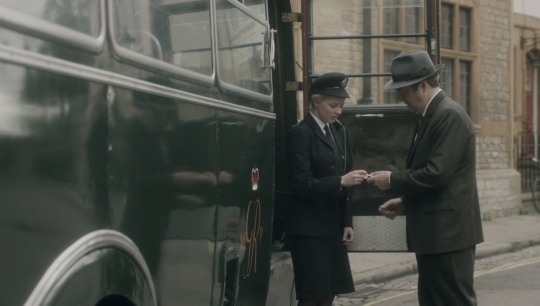
We get the first glimpse in in Coda when Thursday comforts Trewlove with the offer of a cigarette as she copes with the murder of a fellow officer:
THURSDAY: All right? TREWLOVE: They just shot him. Like it was nothing. THURSDAY: Here. For the nerves. Keep the pack. Stick 'em behind your notebook and nobody'll know. TREWLOVE: Thanks. THURSDAY: Tip my old governor gave me. Sergeant Vimes. Cable Street. “No Pasarán!” All right? Let’s have that jacket buttoned up, then. TREWLOVE: Sir.
It's such a little exchange, but it delights me in so many ways. There's the sweetness of the interaction between Thursday and Trewlove. There's the irony in hindsight of his "thoughtfulness" in helpfully encouraging her to smoke. There's the nod to Terry Pratchett's Discworld with the references to both "Sergeant Vimes" and "Cable Street." And finally there's the nod with “No Pasarán!” to the actual Battle of Cable Street that occurred in the East End of London in 1936.
A nostalgic reference to “No Pasarán!” is actually a bit ironic coming from a former Met officer. As the unfortunate party charged with keeping the two opposing sides "peaceful," the Met faced some of the worst violence on that day. However, Fred Thursday would not have experienced it as a police officer.
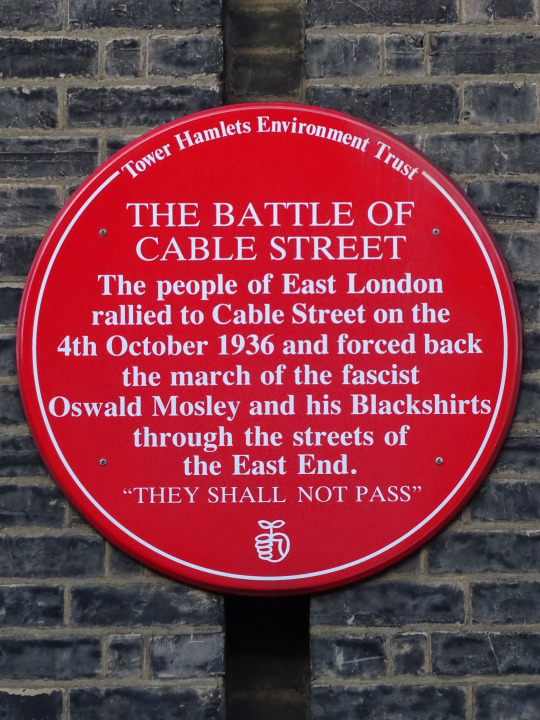
We know from the episode Home that he didn't join the police until two years later, in 1938. We find out in Cartouche though, that he did grow up near Shadwell Basin—about a ten minute walk from where the main showdown in the Battle of Cable Street occurred—so there's a good chance that Thursday would have witnessed the events of that day and maybe even participated.
Here's my understanding of what happened: The British Union of Fascists—a group openly aspiring to create a British state in the style of Hitler's Germany or Mussolini's Italy—attempted to stage a march through the middle of London's East End. Their leader was Oswald Mosley, a horrible but charismatic minor aristocrat with a Hitler-wannabe-mustache, his own cadre of paramilitary "Blackshirts," and—unbeknownst to him—a major problem in his ranks with deep infiltration by Special Branch.

Why the East End? It was the poorest area of the city and thus home to the most recent immigrants—in particular, the UK's largest Jewish population—many of whom had escaped rising persecution elsewhere in Europe. At the same time, the East End was also home to the Londoners hit hardest by the rising unemployment of the 1930s.
Mosley's rhetoric had finally become openly and unapologetically anti-Semitic in 1935 and the idea that Jewish immigrants were the ones responsible for stealing jobs from the "native" British was a simplistic explanation offered by the BUF that unfortunately resonated with many East Enders. So ultimately, the East End was home to both the main target and the BUF and some of its biggest supporters.
In October of 1936, Mosley planned for his Blackshirts and their supporters to march through the heart of the East End. Determined to both defend themselves from threats of violence and stop the march from passing through their community, Jewish leaders and others mobilized, successfully recruiting thousands of their East End neighbors and others allies to assist.

© Jewish East End Celebration Society
On the day of the march, despite a massive police escort, the BUF was turned back repeatedly. The slogan of the day, borrowed from the Republican fighters in the Spanish Civil War was, "They shall not pass" or "No Pasarán!”
Eventually, things came to a head at the junction of Cable Street and Christian Street. Multiple barricades were erected and the BUF marchers were pelted with rotted vegetables and the contents of chamber pots. It became a pitched battle at one point. Unable to break through the East End, Mosley was finally forced to relocate his followers to Hyde Park.
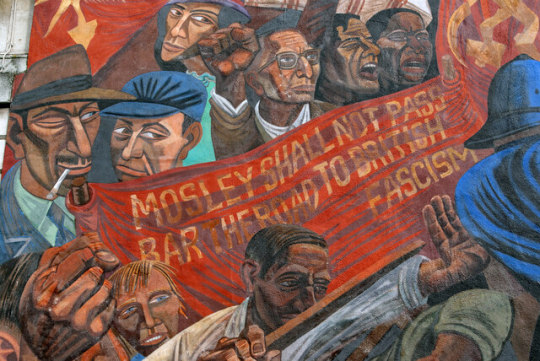
© Copyright Jim Osley Detail from a mural painted on the side of the former St George's vestry hall
S5E4: Colours
The Battle of Cable Street was a humiliation for the fascists and for Mosley, a victory for the Jewish community and their allies. Sadly, the happiness was very short-lived. Mosley was able to frame Cable Street in the press as an attack by the left on his right to free speech.
There was an immediate increase in support for the BUF in the greater London area, particularly in the East End, and an increase of violence against Jewish people in the UK. Oswald Mosley himself travelled to Germany only two days after Cable Street. There he married socialite Diana Mitford in a secret ceremony at the home of Joseph Goebbels with Hitler attending as the guest of honor.

Mosley and Mitford CC-BY-2.0
However, the increase in support that occurred right after Cable Street was brief in itself. As the threat of Nazi Germany became more apparent in the UK, the popularity of the BUF declined. Once the war began, the Mosleys were interned under a provision that applied to active Nazi sympathizers.
Post-war, Mosley attempted to once more find a place in politics but fortunately never moved beyond the fringe. He and his wife became prime movers in advancing various Holocaust denial theories and later espoused rather unpleasant opinions on topics such as the forced repatriation of immigrants and mixed-race marriages.
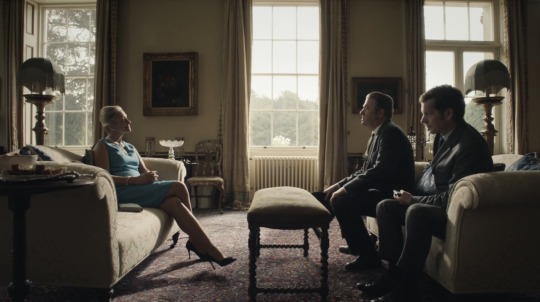
If this all sounds familiar, it's because it all crops up in the storyline of Colours where the character of Charity Mudford, Lady Bayswater is a stand-in for Diana Mitford. RL's dialogue very much captures the sheer banality of the real Diana Mitford's evil:
BAYSWATER: I can't change the past. If Winston hadn't been so eager for office, all the unpleasantness might have been avoided. My husband had Hitler's ear. We could have persuaded him. Softened his resolve. He wasn't immune to reason. THURSDAY: Charming conversationalist, no doubt. BAYSWATER: Actually, he was a very good mimic. Terribly witty. MORSE: Sir, is it time for that telephone call? To the station? I can take it from here. THURSDAY: The unpleasantness, as you call it, cost me six years of my life, and untold millions a great deal more.
S7E2: Raga
But we're not quite done yet. The BUF had a successor. The National Front was founded by a former member of the BUF who then joined forces with John Tyndall, the leader of the Greater Britain movement which had a big anti-immigration focus.
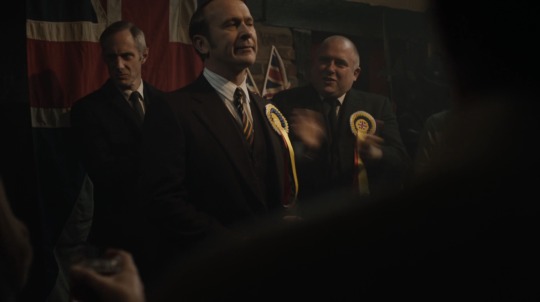
As with Jewish immigration a generation earlier, heavy South Asian migration to Britain in the 1970s made it an easy target for those seeking to pin all of the nation's economic and social problems on "outsiders."
The National Front eventually came out with an agenda that called for the revocation of citizenship for all non-whites in Britain and forcible repatriation to their "native" countries. NF rallies were frequently accompanied by violence whipped up by the kind of rhetoric we hear in Raga where the character of Gorman serves as a stand-in for Tyndall and his ilk:
THURSDAY: Well, we're very concerned about young Pakistani lads getting knifed on the street. GORMAN: Terrible. But I can't say that I'm surprised. You cram all of these incompatible cultures together on one small island, of course it's gonna lead to blood. And worse. MORSE: Sounds like a threat, Mr. Gorman. GORMAN: It's just an observation. If the police can't keep the streets safe and defend the indigenous population against outsiders, well, no wonder people take it into their own hands. Now, if you'll excuse me, I've got a seat to win.
If anyone sees anything that I've gotten wrong here, please let me know. This was my first time reading through any source material on this whole topic and it's complicated (and depressing as hell).
I haven't got any pithy, final point to make except to say that there are certain ideas that seem to cycle back with horrible regularity every time certain conditions are in place. They're wrong. They're simplistic. They're hateful. And they need to be stopped every time.
#itv endeavour#endeavour morse#endeavour: coda#endeavour: colours#endeavour: raga#meta#battle of cable street
69 notes
·
View notes
Text
right just throwing this out there but if you’re not from the UK, we’ve just had local elections (elections to local councils, aka the people who deal with immediate issues in a condensed local area) and a party called “Reform UK”, formerly the Brexit party, formerly formerly “UKIP”, have made significant (although thankfully mostly insignificant) gains. they’re led by Nigel Farage, known arse-kisser of Trump, spineless grifter, charlatan, and all-around deeply unpleasant person.
in each speech Farage makes, he’s increasingly sounding more and more like Oswald Mosley, who was the leader of the “British Union of Fascists”, aka literal Nazi sympathisers. whether or not he’s doing it because he actually believes it, or for money… I don’t really care. it’s gaining traction.
the UK isn’t perfect. I am a queer person whose Ashkenazi Jewish heritage shines through in my features. this was something I used to be proud of; now, given how hostile the UK politics and media are increasingly getting towards minorities, I’m increasingly anxious. and I’m white, and was born here, but I have had multiple instances when people have clocked my Eastern European heritage based on just looking at me. and, again, I am white. my heart is breaking for people of colour right now.
the best thing about the UK, in my opinion, is that it’s been shaped by so many different cultures, ethnic groups… it’s a melting pot. and that’s AMAZING. I hate the UK politically but if you’re out at the pub, in the sun, and especially if we’re doing well at a sport? it’s an amazing place
I also want to add - because I feel like most of you know that transgender women have been unfairly targeted via a recent supreme court ruling - that queer rights are so fucking recent in the UK. in 1989, Thatcher introduced the infamous “Section 28” which made it illegal to publish media portraying gay people, or talk about being gay in schools. everyone who was complaining about Good Omens not being explicit in queer rep (Gaiman being awful aside) - this is why. it wouldn’t have been published.
to illustrate how recent this was, Section 28 was revoked when I was 7 years old. I am currently 28. and the impact it had on me as a queer person was immeasurable. that type of ingrained hatred didn’t go away as soon as the policy was lifted. a girl I went to school with was outed as a lesbian and pelted with stones by a group of boys in 2011.
Nigel Farage and Reform UK are trying to drive the UK back in that direction.
also everything about British people “taking it back”…
I’m also Welsh. I’m Welsh and fucking proud of it. my great-grandmother was beaten for speaking it (with something called the Welsh not; Great-Gran was born in 1914 and regardless of what wikipedia says, it was used on her at school), so she never learned it. so she didn’t pass it on to my grandad, and it didn’t get passed down to my mum, who learned bits of it in school but, when she was choosing her GCSE subjects, was told she needed a language if she wanted to go to university. Welsh, the language native to the country where she lived her whole life, wasn’t counted as a language.
this was in 1981.
I know bits of Welsh. I can read it, I can speak it at a very basic level, but not much. not as much as I should be able to. when I told my mother I was learning our heritage language, she shouldn’t have felt the need to burst into tears and hug me.
…my point being, Farage and Reform don’t know what they want to “take back”. WW2 values? WW1 values? young men going off and dying abroad for a conflict that’s happening because some royals in a different country beefed with their each other, because you know they’d be backing Hitler during WW2?
to my foreign friends, please keep the UK in your hearts. despite everything, I promise we’re not all terrible and the vast majority of us care deeply about other countries, and our impact.
to my UK friends? rise up. protest. vote against Reform. call Farage a facist outright. protect the people of colour in our communities. don’t let him win.
21 notes
·
View notes
Text
I just posted this in a thing about military chic, but now I'm posting it here because I am. Deal with it if that bothers you (this site is free, you can always just leave or unfollow me). For people who want a military chic look made from actual military stuff, some tips from an ex military surplus store worker and briefly online seller...


I recommend the Swiss wool coat highly with one caveat. It looks a little...German, but it's amazing quality (because the Swiss believe in quality), and if you go for one of the slash-pocketed ones they are just gorgeous (the older horizontal pockets are fine too). It comes in long and short varieties, and the rolled French cuffs are handy if your arms are a bit longer. It's a lighter weight wool coat, good for up to 45F and down to about 20F, colder with a sweater. I recommend the older ones with metal buttons, but there's a later plastic/bakelite button version that works well enough too. They make corresponding trousers that are great, but at that point you are going in almost full uniform, so I recommend switching it up with a good pair of Swedish or German (postwar) wool trousers just so you don't look too much like a certain type of 'German history enthusiast.'
Here's a link to one on eBay. They tend to run about $70-$150, plus shipping, so watch where you order them from because if you're getting something from Lithuania, shipping's going to be a bit. To defunkify anything (and there will be funk most probably), I recommend handwashing or soaking that shit in a mild detergent or Woolite.
However... Don't sleep on Bulgarian Army surplus. Their wool greatcoats are made on the Russian/Soviet WWI/WWII pattern, single breasted and slightly offset. Middle weight, with enough room for a sweater depending on what size you order relative to your build. Plus, there's usually an inner pocket for your trusty Makarov while you hunt for enemies of the Revolution or whatever. Again, it's got the French cuffs, and those are just lovely.

Or you have your US Army greatcoat. A beast, but wonderfully warm:

And then there's the US Marine WWII wool coat. This one is a steal at $48, but you'll have to be small enough to fit into it.

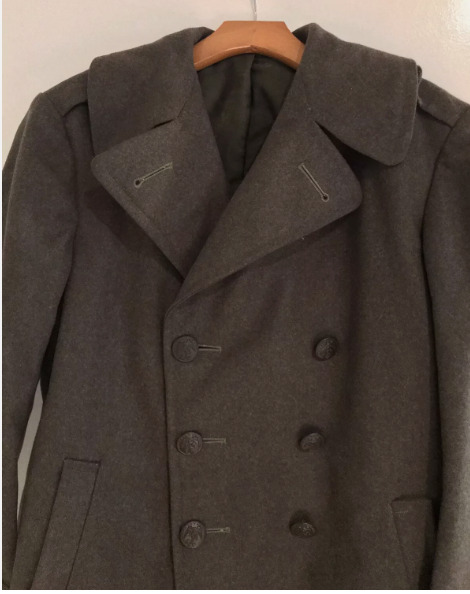

It's what I would call a forest green, darker than the mustard-green color of the US Army coat, and the wool is less coarse, this is a coat you could live in, especially if it still has the silk lining. It's thick enough, but not so thick you can't move around in it (that's true for all the coats listed here). You can get it (and the US Army greatcoat) in a cutdown, jeep coat style. It's shorter and made for, as you guessed, hopping in and out of a jeep without getting snagged on anything so you can go send whatever fascists you need to to their reward. Nice, but you'll want a good pair of trousers with it (again, check out the USMC wool trousers from this era, they're handy). The quality on this is second only to the Swiss stuff. I'm not sure why. If you're looking for something in the same color but a bit lighter and shorter, I recommend the winter service jacket above.. And we've got the British Household Guard overcoat. Technically fine, but, eh, I'm not a fan for some reason. Well made though.

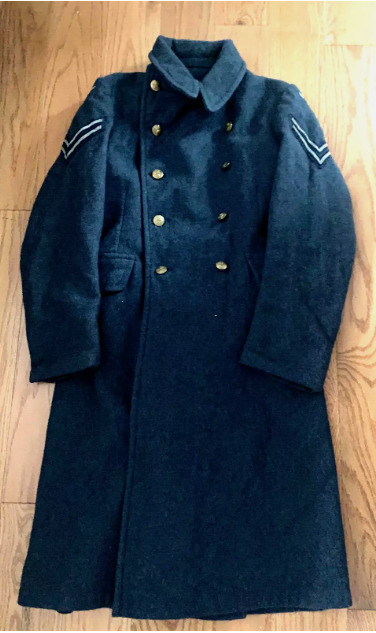
I'm more partial to this double-breasted British coat. And this Civil Defense coat is just a fucking gem. I'd love to find one in my freakishly tall size.

Avoid, I'd say, the later Cold War era Soviet Coats, they are big and wool and tempting, but they are usually stiff as a frozen poet in the gulag. I've owned two (bought cheaply each time) and given them away because they just weren't keeping.

Just...I get it, I get why it's tempting. It's got that Soviet swagger, but like the later Soviet Union, inside it just doesn't quite work.
#military surplus#wool coats#greatcoats#military chic#military fashion show#wwii#coats#soapbox#in which i ramble#us army#us marines#bulgarian army#swiss army#soviet chic
24 notes
·
View notes
Note
Also while I'm on a train of blatant self-projection and my blood boils on the theme of patriotism, I proclaim Nikolai allergic to birch blooms.
They spoon-fed me all that берёзки as a symbol of Russia curated patriotism bullshit from the youngest age and I am so sure that my pure unadulterated hatred towards the tree on account of me being horribly allergic to it played a part of me growing up as un-patriotic as one can be
(This is obviously a joke and I do have my patriotic moments, although much tamer than Nik. But blooming birch is still my sworn enemy. Bitch, you're a plant, procreate sexlessly, why you gotta make my life so miserable every spring, your flowers look like whipped worms anyway)
Sorry for ranting in your ask, you just evoked Feelings in me as you do
Haha, anti-patriotic sentiment through virtue of an allergy is such a mood. Being force-fed propaganda is always the best way to make a young person hate their country, and it's proven ineffective. I'm so sorry about the tree torture. 😞
My example is the union flag. I have an absolute hate-love relationship with it, because it's flown over genocides, oppressed peoples, atrocities. British history is a mire of sins. The world could have been so different without the fingerprints of British imperialism all over it. I'm lucky in that we have never been required to swear a pledge of allegiance, or raise the flag at any point at school, but I was forced into the cadets to try and sort me out, where it was flag-shagging from dawn 'til dusk (and racism, homophobia, misogyny, etc).
But... I took a union flag with me alongside my rainbow flag to an anti-fash protest and actually tore into some middle-aged woman when she told me to put my union flag away because someone might think I'm far right. Uh, no, this flag of my people, and if the far right want it, they can come take it out of my hands themselves. You're essentially condemning an entire country by surrendering their international representation to fascists. The rioters from Cable Street would be disgusted.
But ... I dunno. The St. George's Cross (England flag) is a lost cause. If I see some cunt with that tattooed on them or in their hand, I know they drink Stella, beat their wives and think shouting slurs at minorities is the height of humour.
Anyway. A ramble for a ramble, m'love. ❤️ I am always here for learning about other people's cultures and lives. The world is so Americanised online sometimes, it's like the other few billion people don't exist...
30 notes
·
View notes
Text
Lily Evans Was a feminist. Ergo So Was James Potter
I don’t know how to tell you this but:
1. Canon James Potter only asked Lily Evans out once.
ONCE
The whole “he kept asking her out every few minutes for years till she relented” thing is complete fanon
Makey-upy
Capisce? ONCE
2. Lily Evans wasn’t a pushover
Lily was canonically a firebrand. She was kind and beautiful, sure. but - she was described as cheeky and clever. She could be scary (Sirius & James in SWM). She was a muggleborn growing up in 1970s Britain. For those not aware, this was happening in 1970s Britain:
“ If you’re black, working class and a woman, you lose out three times over” (1971)
Also - we know she was from a nondescript midlands town. This was what it would have been like:
So you’re telling me that a bright, intelligent, studious woman and a bit of a rebel, who refused the offer to join Voldemort and duelled him 3 times - who volunteered to get involved in an underground/illegal, subversive group in a war against Wix bigoted fascist-types - somehow wasn’t remotely interested in the women’s rights movement, CND (Campaign for Nuclear Disarmament), workers’ right and the Gay liberation Front?
Everyone can make up their own marauders headcanons etc etc - but for me, with that personality?
Not a chance
Ok, but then, if we agree Lily wasn’t clueless about feminism and other social movements in 1970s/early 1980s - you think she’d actually date Potter (let along marry the bloke) if he wasn’t a feminist too??
ARE YOU OUT OF YOUR MIND???
In the same way I’d never ever even consider a single figment of an imagined date with a Trump Guy, Lily Evans wouldn’t go out with someone uninterested in women’s rights… that’s just the way it is.
(You can decide did he start off not v knowledgeable about this area and need a lot of education to undo misogynistic thinking. Or you can decide that Mia Potter (with her husband’s full support) was a strong woman who was really involved in rights movements in the Wix World and James Potter understood all this stuff from the age of 3. I don’t care)
@chdarling’s The Last Enemy certainly has themes involving this stuff, and we know that’s our canon bible!
Or, inferior fic obviously, but from We Can Be Heroes:
“To paraphrase President John F. Kennedy: Ich bin eine Feministin.”
#lily Evans not a feminist????#gurl#what!?!#she so was#please#and so was James!#not up for debate#nuh uh#end of story#finito#I have it from the mouth of Lily Evans#👏👏👏👏#marauders headcanon#oops sorry I meant FACTS#ich bin eine feministin#ok it should have been ich bin Berliner#I think?#ich bin Feministin#but it wasn’t because JFK wasn’t German 😬😂
50 notes
·
View notes
Text

Uncredited Photographer Two Members of the Anti-fascist 43 Group, Gerry Flamberg and Jonny Wimborne, After Being Acquitted of Trying to Kills a British Fascist, London 1948
The 43 Group was made up mostly of demobilized British Jewish Soldiers who had fought fascists on the continent during World War II and weren't about to sit around passively as members of the British Union of Fascists marched through their neighborhoods at home. So, they regularly confronted British fascists in the streets and broke up fascist meetings, usually beating them silly while barely cracking a sweat. Probably the most prominent member of the 43 Group was the hairstyle artist, Vidal Sassoon. A British fascist, one John Preen, concocted a tale that 43 Group members Gerry Flamberg and Jonny Wimborne had tried to murder him, but offered no evidence to support his case. Flamberg and Wimborne were rapidly acquitted, even though they admitted to beating fascists on London's streets.
77 notes
·
View notes
Text

Policemen arresting a demonstrator when local people blocked the march of the British Union of Fascists in Cable Street in London’s East End. 4 October 1936.
135 notes
·
View notes
Photo
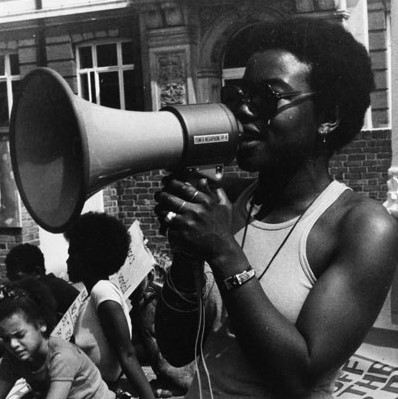
On this day, 12 July 1979, Olive Morris, feminist, squatter and activist in the Brixton Black Panthers, died aged just 27. Born in Jamaica, Morris moved to the UK aged 9 to be with her forklift operator father and factory shop steward mother. One of her earliest political actions was at 17 when she intervened when police in Brixton, south London, were arresting a Black man for an alleged parking offence. She was racially abused and physically attacked by officers, then arrested, fined and given a three month suspended sentence for two years. In her short life Morris played a leading role in radical movements in Britain, getting involved with and helping found numerous groups and projects like the Black Women's Mutual Aid Group. She also was critical of the white left and union movement, which spouted rhetoric about "unity". But in reality, at employers like Standard Telephones and Cables, they defended practices like lower pay for Black workers, and scabbed on Black workers' strikes. About single issue anti-fascist groups, Morris said: “Not a single problem associated with racialism, unemployment, police violence and homelessness can be settled by ‘rocking’ against the fascists, the police or the army… The fight against racism and fascism is completely bound up with the fight to overthrow capitalism, the system that breeds both.” In 1978, she became unwell, and was then diagnosed with non-Hodgkin's lymphoma. She succumbed the following year. You can learn more about racism in the British workers' movement, and how it was fought against and radically altered by the Grunwick strike in our podcast episodes 67-68: https://workingclasshistory.com/podcast/grunwick-strike-1976/ https://www.facebook.com/photo.php?fbid=660349202804965&set=a.602588028581083&type=3
233 notes
·
View notes
Text
Joachim von Ribbentrop
Full name - Ulrich Friedrich-Wilhelm Joachim von Ribbentrop
If that isn't a freaking mouthful.
Ribbentrop first came to Adolf Hitler's notice as a well-travelled businessman with more knowledge of the outside world than most senior Nazis and as a perceived authority on foreign affairs.
He offered his house Schloss Fuschl for the secret meetings in January 1933 that resulted in Hitler's appointment as Chancellor of Germany. He became a close confidant of Hitler, to the dismay of some party members, who thought him unintelligent, superficial and lacking in talent.
Before World War II, he played a key role in brokering the Pact of Steel (an alliance with Fascist Italy) and the Molotov–Ribbentrop Pact (the Nazi–Soviet non-aggression pact). He favoured retaining good relations with the Soviets, opposing the invasion of the Soviet Union.
The Austrian appointed Ribbentrop as the ambassador to London in August, 1936. His main objective was to persuade the British government not to get involved in Germany territorial disputes and to work together against the the communist government in the Soviet Union.
When Ribbentrop presented his credentials to George VI on 5th February, 1937, the British were outraged when he gave the Hitler salute. He also upset the British government by posting Schutz Staffeinel (SS) guards outside the German Embassy and by flying swastika flags on official cars.
On 4th February, 1938, Ribbentrop replaced Constantin von Neurath as Germany's foreign minister. Traudl Junge (AH's last secretary) met him during this period: "Ribbentrop was a very odd man. The impression he made on me was of someone absent-minded and slightly dreamy, and if I hadn't known that he was Foreign Minister I'd have said he was a cranky eccentric leading a strange life of his own."
Picture - Ribbentrop holding his son Barthold.

#wwii era#ww2 history#ww2#ww2 germany#wwii#wwii germany#3rd reich#reichblr#Ribbentrop#von Ribbentrop#joachim von ribbentrop
12 notes
·
View notes
Note
hey im a baby punk, and i just started making a patch jacket (is that what its called?), its only a couple roller derby patches and a book quote beaded on right now, but what would be some good (preferably subtle, cos parents :\ ) things to add?
-ghostflower
0) HI THIS HAS BEEN SITTING IN MY DRAFTS AND I DONT KNOW WHY IM SO SORRY
1) I absolutely love the name ghostflower
2) patch jacket and battle jacket are interchangeable for the most part. Battle jackets have a bit of history behind them stemming from WW2 (I have a Punk 101 post saved in my drafts about this actually), but in 95% of cases I’d argue patch jacket and battle jacket is interchangeable
3) THINGS TO ADD!!!
I’ve made a post about this before too but hey everyones always looking for more ideas, right?
Sew on random but meaningful/useful objects (bottle opener, festival wristbands, guitar pick, etc)
Sew a pocket for something (like a lighter or tickets you collect)
Its common to see patches that are just a cool pattern of fabric (leopard, zebra, funky 70s looking things)
I’ve seen people wire speakers into their jackets to connect to their phones when they walk around (far beyond my skills but cool nonetheless)
Paint pins out of bottle caps (they can be anything! Maybe even something roller derby related!)
The Union Jack (also known as the British flag) has had a prominent place in punk culture/aesthetic
Black cats are a symbol associated with anarchy movements
The 4 symbols of Led Zeppelin
161 is a code for Anti Fascist Action
Put non-subtle things in ‘secret spots’ on your jacket, such as the interior or under the collar (assuming you know people wont be able to check it out if you dont want them to)
As always, add more in the notes if you have ideas!!!
259 notes
·
View notes